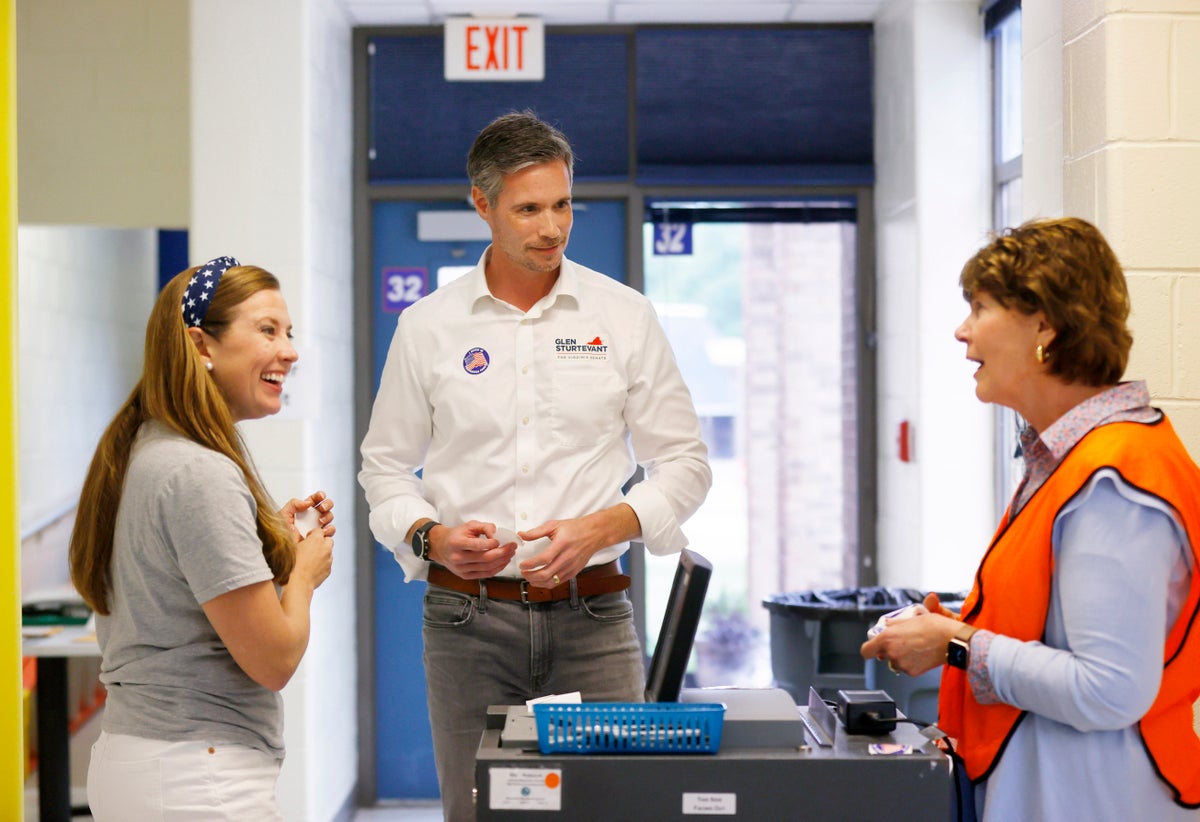
Former state legislator Lashrecse Aird defeated incumbent and self-described “pro-life” Democrat Sen. Joe Morrissey on Tuesday in a closely watched primary election nomination contest in Virginia that centered on abortion rights.
Aird, a former member of the state House of Delegates, ran a campaign heavily focused on Morrissey’s position on abortion. A veteran lawmaker and one of the most controversial figures in Virginia politics, Morrissey has expressed a willingness to vote with Republicans to enact stricter limits on abortion in Virginia sought by Republican Gov. Glenn Youngkin.
Morrissey was just one of many incumbents facing spirited challenges Tuesday in an election season that’s been upended by redrawn political maps legislative candidates are running in for the first time this year.
In a contentious Republican contest for a southwest Virginia House seat, freshman Del. Wren Williams defeated fellow Del. Marie March. In northern Virginia, former CIA officer Russet Perry secured the Democratic nomination in a Senate seat expected to be a key battleground in the general election. Many other key races had not yet been called.
Aird won her race with the help of an unusual number of legislators and members of the state’s congressional delegation who endorsed her. She also far outspent Morrissey, who ran a scrappy operation with no official campaign manager.
Until this race, Morrissey had time and again overcome personal controversies to win elected office. As he campaigned for office this year, he faced allegations of mistreatment and physical abuse by his decades-younger estranged wife, which he strenuously denied.
Despite those headwinds, many observers were unwilling to count him out because of his long-established reputation as an effective grassroots campaigner who takes care of bread-and-butter issues for constituents. Morrissey conceded to Aird.
Aird, who works in higher education administration, will head into the general election season as the heavy favorite in the blue leaning district south and east of Richmond.
Tuesday’s primary featured 22 contested races for the state Senate and 25 contested races for the House of Delegates, though in one of those House races, a GOP contender dropped out at the last minute. Some GOP nominations have already been settled through party-run contests.
This year marks the first cycle in which legislative candidates are running in districts created during the redistricting process that ended in late 2021. The new maps were drawn by outside experts without regard to incumbent protection. That's contributed to a wave of retirements by many of the General Assembly's veteran lawmakers and diminished the name-recognition advantage for incumbents, some of whom are running in almost entirely new districts.
Altogether, it’s expected to lead to significant turnover in the Legislature come January.
“It’s time for some new blood,” said Gail Coleman, 62, who voted in suburban Richmond for Aird.
Virginia, where the General Assembly is currently politically divided, is one of the few states that holds its legislative races in odd-numbered years. With its unusual calendar and quasi-swing state status, the state’s results are often closely watched for hints of voter sentiment heading into the following year’s midterm or presidential cycle.
Key races were taking place around the state. In Hampton Roads, two veteran legislators — Sens. Lionell Spruill and Louise Lucas — are competing in one of the year’s only matchups pitting incumbents from the same chamber against each other. The race for the nomination in a heavily Democratic Chesapeake-anchored seat has been marked by personal attacks lobbed on social media and in TV ads.
A cluster of primaries in northern Virginia features incumbents facing off against progressive challengers. Sens. George Barker, Jeremy McPike, Dave Marsden and Chap Petersen are all seen as having some degree of vulnerability.
In a Charlottesville-anchored seat, Sen. Creigh Deeds faces a spirited challenge from Sally Hudson, a member of the House of Delegates since 2020.
Among Republicans, the only Senate incumbent facing challengers Tuesday was Amanda Chase, a right-wing firebrand who no longer caucuses with her party. She’s running against Tina Ramirez, a nonprofit leader and religious freedom advocate, and Glen Sturtevant, an attorney and former senate member, for the nomination in a red-leaning suburban Richmond seat.
Few observers see a clear single frontrunner in Senate District 1, a red Shenandoah Valley-based seat featuring an eight-way contest. And two races, one in an eastern Virginia district and another for a Fredericksburg-area seat, will test the power of Gov. Glenn Youngkin’s endorsement. Youngkin, who only waded into a handful of contested nomination fights, backed female lawmakers in both districts, which lean red but could be competitive in the fall.







